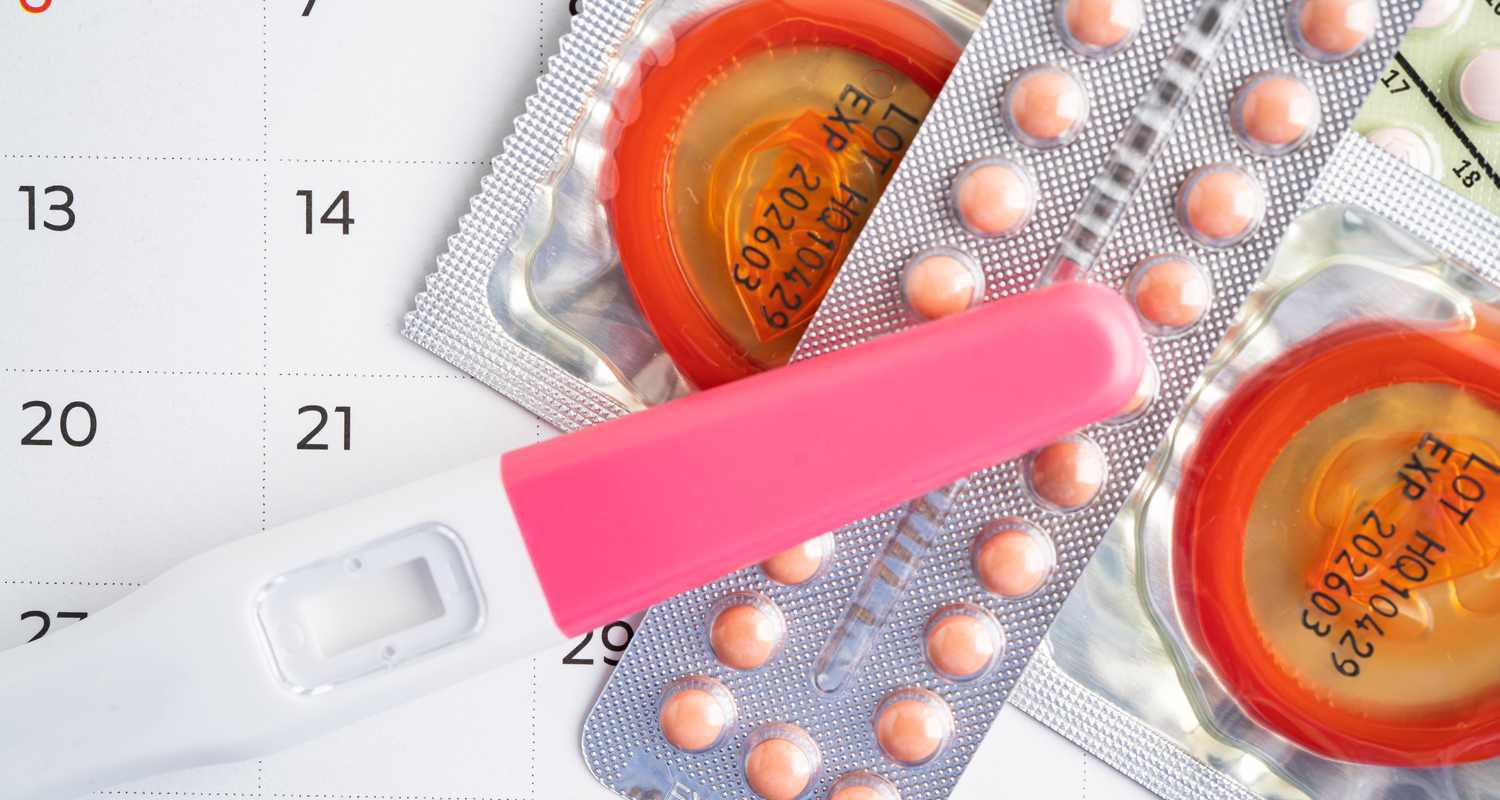- Nicholas DiBella
- Published: June 30, 2025
- Fact-checked by Dr. Desiree Granados

As women enter their 40s and 50s, many begin to experience the disruptive symptoms of perimenopause, such as hot flashes, irregular periods, mood swings, and sleep issues. These changes are caused by fluctuating hormone levels, and for many, relief comes from hormone-based therapies. Two of the most common options are birth control pills and hormone replacement therapy (HRT).
In this guide, we’ll compare HRT and the pill for controlling perimenopausal symptoms and explore which might be better for different women. We’ll also address some of the most common questions about managing hormones and reproductive health during this life stage, including whether you can take the pill and HRT together, whether HRT works as birth control, and what contraception options are best while you’re on HRT or going through menopause.
HRT vs. the Pill for Perimenopause Symptoms: What Works Better?
Both birth control pills and hormone replacement therapy (HRT) contain estrogen and progestin, but they serve different purposes. Birth control is mainly used for contraception and cycle regulation, while HRT is designed to relieve symptoms of low estrogen in late perimenopause or postmenopause.
Here’s how they compare for common perimenopause symptoms:
- Irregular Periods
- Birth Control: Highly effective at regulating cycles, especially in early perimenopause.
- HRT: Can help stabilize bleeding in later stages but isn’t as effective for cycle control.
- Hot Flashes & Night Sweats
- Birth Control: May help in younger women, but less effective overall.
- HRT: Most effective option—considered the gold standard.
- Mood Swings
- Birth Control: Can stabilize mood, especially in women with PMS/PMDD, though some may feel worse.
- HRT: Can improve mood related to estrogen decline, but effects vary.
- Sleep Problems
- Birth Control: Not particularly helpful.
- HRT: Often improves sleep by reducing night sweats and supporting hormonal balance.
- Vaginal Dryness
- Birth Control: Offers little relief.
- HRT: Very effective, especially when using local (vaginal) estrogen.
- Acne & Skin Changes
- Birth Control: Effective, especially with formulations that reduce androgens.
- HRT: May help skin hydration but not a treatment for acne.
- Birth Control Needs
- Birth Control: Provides reliable contraception.
- HRT: Not contraceptive—additional birth control is needed if you’re still ovulating.

Can You Take the Pill and HRT Together?
In most cases, you should not take the birth control pill and HRT at the same time.
Both treatments contain estrogen and progestin, but combining them can lead to excessive hormone levels, increasing the risk of blood clots or other complications.
That said, there are exceptions. Some women may use the pill in their late 40s and then transition to HRT once they stop ovulating regularly. A healthcare provider can help guide this shift to ensure your symptoms are managed without overlapping hormone exposure.
Does HRT Work as Birth Control?
No—HRT does not prevent pregnancy. Although HRT contains estrogen and sometimes progestin, the doses are too low to suppress ovulation, which is necessary for birth control. If you are still in perimenopause and sexually active, you can still get pregnant, even with irregular or infrequent periods.
Women should continue using contraception until they’ve gone 12 months without a period (which marks the official start of menopause). After that, birth control is no longer necessary.
What Contraception Is Best While on HRT?
If you’re taking HRT and still need contraception, it’s important to choose a method that complements your hormone therapy without adding unnecessary risk.
The most effective contraception options while on HRT include copper IUDs, which are hormone-free and long-lasting; hormonal IUDs, which deliver a low dose of progestin locally and pair well with estrogen-only HRT; and the progestin-only pill (also known as the mini-pill). Barrier methods like condoms or diaphragms are also safe and hormone-free. For those who do not wish to get pregnant again in the future, permanent options like tubal ligation or vasectomy are also common and highly effective.
It’s best to avoid combined hormonal contraceptives (like traditional birth control pills) alongside HRT unless prescribed by a doctor for a specific reason.
What contraception should I use during perimenopause and menopause?
During perimenopause, fertility declines but doesn’t disappear. Therefore, if you’re trying to avoid getting pregnant, you will still need to use contraception. The right option depends on your age, medical history, and whether you’re also managing menopause symptoms.
If you’re under 50 and still having periods, a low-dose birth control pill may be ideal for both symptom relief and contraception. If you’re transitioning off the pill and onto HRT, methods like the hormonal IUD or mini-pill can bridge the gap. If you’re close to menopause, non-hormonal options or permanent contraception may be most appropriate.
Once you’ve gone 12 months without a period, you’re considered menopausal, and contraception is no longer needed. At that point, you may continue HRT for symptom management alone.
Conclusion
Deciding between the birth control pill and HRT for perimenopausal symptoms depends on your age, symptom severity, and whether you still need contraception. The pill may be ideal for women in their 40s who need both symptom relief and pregnancy prevention. HRT is typically better suited for women who are postmenopausal or no longer ovulating regularly.
You should not take both the pill and HRT together unless directed by a provider. And remember: HRT does not prevent pregnancy, so you’ll need to use an alternative birth control method besides the pill.
To determine what’s right for you, talk to a healthcare provider who understands hormonal transitions and can personalize your treatment plan. With the right approach, you can manage your symptoms and protect your reproductive health during this important life stage.
How we reviewed this article:
- Benjamin J. Delgado, Wilfredo Lopez-Ojeda (2023). Estrogen
https://www.ncbi.nlm.nih.gov/books/NBK538260/ - Michael Edwards; Ahmet S. Can (2024). Progestins
https://www.ncbi.nlm.nih.gov/books/NBK563211/ - Argyri Gialeraki, et al. (2017). Oral Contraceptives and HRT Risk of Thrombosis
https://pmc.ncbi.nlm.nih.gov/articles/PMC6714678/ - A E Gebbie, A Glasier, V Sweeting (1995). Incidence of ovulation in perimenopausal women before and during hormone replacement therapy
https://pubmed.ncbi.nlm.nih.gov/8605779/ - Maria G Meyers, Lauren Vitale, Kathryn Elenchin (2021). Perimenopause and the Use of Fertility Tracking: 3 Case Studies
https://pmc.ncbi.nlm.nih.gov/articles/PMC10009143/
Current Version
June 30, 2025
Written By
Nick Dibella
Fact-checked By
Desiree Granados
Editorial Process
Our Editorial Process

Nicholas DiBella received his psychology degree from West Chester University of Pennsylvania and has been writing content for the Sanctuary Wellness Institute since 2023. He is passionate about all things health & wellness.







